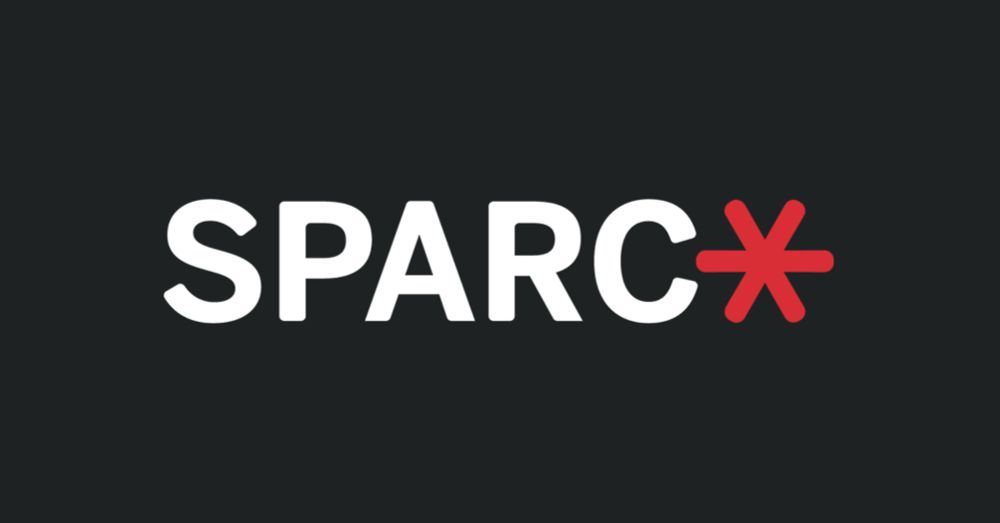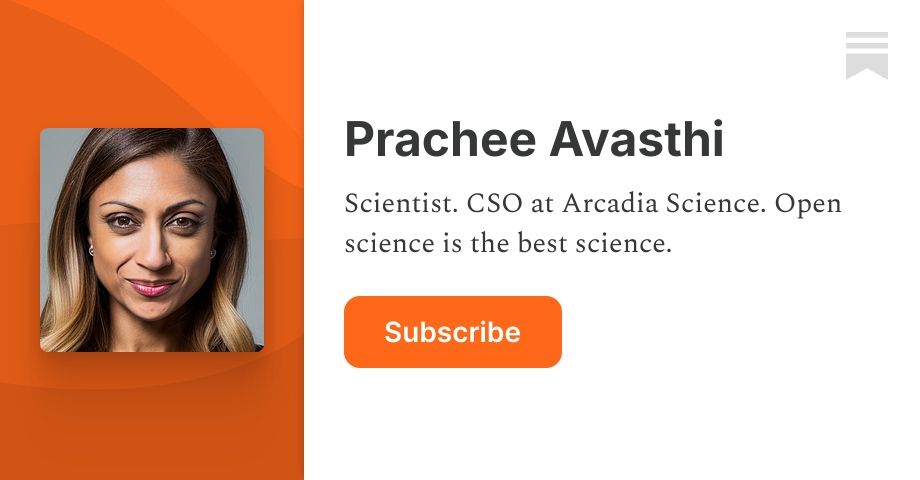
Open Science Operations Associate
Join Astera as an Open Science Operations Associate! Support open science programs, connect with researchers, and help accelerate scientific progress. In-person, based in Emeryville, CA.
New job alert!
If you're passionate about open science, organized, enthusiastic about meeting new people doing exciting work in this space, and want to nerd out with me on all the ways we can move the needle on open science @asterainstitute.bsky.social, apply now!
jobs.ashbyhq.com/astera/f085e...
13.01.2026 19:53 — 👍 3 🔁 10 💬 0 📌 0
The "my competitor will see my preprint and replicate/rush their story to a journal" = their competitor has to have already done at least the rate-limiting parts of the work.
To me, this is about someone wanting to receive exclusive credit for work that other groups were doing simultaneously.
12.01.2026 17:23 — 👍 20 🔁 4 💬 2 📌 1
Right on. Get rid of the riff raff. The humorless of today is the reply guy of tomorrow
11.01.2026 01:56 — 👍 2 🔁 0 💬 0 📌 0

Funders Roll Out Next Gen Open Policies - SPARC
Learn about #preprints & accelerating #OpenAccess to research in our story featuring HHMI, Gates & Astera. @hhmi-science.bsky.social, @madubs.bsky.social, @gatesfoundation.bsky.social, @openaccessmaven.bsky.social, @asterainstitute.bsky.social, @pracheeac.bsky.social sparcopen.org/impact-story...
08.01.2026 12:07 — 👍 3 🔁 5 💬 0 📌 1
What genetic change to Indian wheat led to superior baking in a tandoor?
A naan sense mutation
10.01.2026 00:07 — 👍 170 🔁 25 💬 18 📌 6
After working closely together across two open science orgs over the last 7+ years, I’ll really miss working with @jessicapolka.bsky.social. She’s a total pro, an exceptional operator, a sharp strategist, and just a fantastic human ❤️. Really excited to see all she does next!
07.11.2025 19:57 — 👍 5 🔁 1 💬 1 📌 0
the poor generalizability of any model output certainly is a function of the structure and redundancy of the training data but i think the greater point here is that human performance isn’t the aspirational goal
07.11.2025 03:23 — 👍 3 🔁 0 💬 2 📌 0
Public Science, Public Good – Public Science, Public Good
Spoke recently to the great folks at the science foundation on their efforts to fund curiosity-driven science. They have a new RFA out for catalytic awards (up to $10K).
Take a look if you’re itching to expand or try out a new idea.
science-foundation.org
04.11.2025 00:33 — 👍 13 🔁 5 💬 1 📌 1
Deadline today!!!
31.10.2025 19:22 — 👍 5 🔁 2 💬 0 📌 1
ICYMI: the deadline to nominate a publishing trailblazer so we can amplify their efforts is October 31!
22.10.2025 14:21 — 👍 3 🔁 2 💬 0 📌 0

Funders Roll Out Next Gen Open Policies - SPARC
ICYMI: Read our impact story on policies at HHMI, Gates & Astera promoting #OpenAccess #OpenScience #OpenData. Thought leaders helping accelerate discovery in science @madubs.bsky.social @openaccessmaven.bsky.social @pracheeac.bsky.social! sparcopen.org/impact-story...
21.10.2025 11:21 — 👍 2 🔁 2 💬 0 📌 1

Careers | Arcadia Science
Evolve with Arcadia.
We have a bunch of new job ads out @arcadiascience.com. If you haven’t checked them out, take a look!
www.arcadiascience.com/careers
16.10.2025 02:45 — 👍 40 🔁 43 💬 0 📌 0
16.10.2025 13:49 — 👍 46 🔁 16 💬 2 📌 1
Ahahahaah it’s been a while
16.10.2025 13:52 — 👍 1 🔁 0 💬 0 📌 0

Careers | Arcadia Science
Evolve with Arcadia.
We have a bunch of new job ads out @arcadiascience.com. If you haven’t checked them out, take a look!
www.arcadiascience.com/careers
16.10.2025 02:45 — 👍 40 🔁 43 💬 0 📌 0
Arcadia Science - Project Director
A Bit About Us We are Arcadia Science, an evolutionary biology company founded and led by scientists. Our mission is to turn natural innovations into real-world solutions by developing systematic and ...
If you’re a PhD scientist with technical skills spanning these areas and also have project/people management experience, I’m looking for you! Apply now, or if you know someone else that would be a good fit, kindly pass along the job ad below! 👇
jobs.lever.co/arcadiascien...
15.10.2025 19:31 — 👍 2 🔁 1 💬 0 📌 1
🚨New job alert! We’re trying to put some tailwind behind developing out some of our new molecular, organismal, and high dimensional phenotyping capabilities @arcadiascience.com and are launching an effort to fuel the fire. But first I need a project director to oversee it.
15.10.2025 19:31 — 👍 4 🔁 6 💬 1 📌 0
😂 asked and answered
14.10.2025 14:28 — 👍 1 🔁 0 💬 0 📌 0
Yes absolutely. It is just post publication peer review rather than gated by it. It’s even better if the peer review is public. Funding always involves peer review as well and journal stamps are terrible proxies and inferior to more substantive vetting regardless
10.10.2025 19:04 — 👍 1 🔁 0 💬 1 📌 0
Waiting for incentives to change in scientific publishing? We’ve got you!
I hope other funders follow suit to make the most of their research dollars
10.10.2025 17:18 — 👍 10 🔁 5 💬 1 📌 0
Must have had a typo or something but they reposted … will repost myself too
10.10.2025 17:18 — 👍 1 🔁 0 💬 1 📌 0
Some scientists aren’t waiting for journals to catch up. They’re showing us what’s next.
The Beyond the Journal awards honor those breaking the mold in how science is shared.
More details: pracheeac.substack.com/p/off-roadin...
Nominate or self-nominate here: www.experiment.foundation/beyond
08.10.2025 00:38 — 👍 28 🔁 12 💬 0 📌 2
Some scientists aren’t waiting for journals to catch up. They’re showing us what’s next.
The Beyond the Journal awards honor those breaking the mold in how science is shared.
More details: pracheeac.substack.com/p/off-roadin...
Nominate or self-nominate here: www.experiment.foundation/beyond
08.10.2025 00:38 — 👍 28 🔁 12 💬 0 📌 2
😂 love it
02.10.2025 23:35 — 👍 1 🔁 0 💬 0 📌 0
Yes why would anyone at a frontier research lab know anything about this topic. I guess uninformed takes by people not working on anything related are usually more useful
29.09.2025 14:04 — 👍 0 🔁 0 💬 1 📌 0
(Associately??) Professing #hci #creativity #toolsforthought #metascience at UMD INFO and HCIL
#immigrant (🇲🇾 ➡️ 🇺🇸 ) #firstgen academic
Building @discoursegraphs.bsky.social #atproto 🤝 #openscience
https://joelchan.me
All things Open Science/Open Data/Open Research. Head of Innovation Initiatives at eLife, Director of Community at ICOR
Empowering Emerging Authors | Manuscripts Coach & Storytelling Advocate | Helping Experts Turn Ideas into Books
Biological theory | “Cell learning” | Function spaces | Projection operators | Manifolds | Dynamics | Behavior | Evolution
livingphysics.org
Cambridge, UK
Living Physics Feed: https://tinyurl.com/living-physics
Marine biologist | Microbiologist | Evolutionary ecologist
Host-microbe interactions | #TeamFish
Assistant Professor at Temple University
Research Associate at Cal Academy
https://gouldlab.squarespace.com
Assistant Professor at UT Southwestern studying the evolutionary diversification of cytoskeletal proteins
Interested in helping cure diseases; machine learning for chemistry and biology
Web tinkerer. Pooling capital and collaboration.
What if we made things a little bit better?
#Vancouver #cooking #restaurant #atproto
Blog about the human side of #science, by Brooke Morriswood (formerly Cam Biochem, CIMR,MRC-LMB,Yale, MFPL, UniWue, now #MedComms). Commentary, silliness, & how-to guides for improving young scientists’ soft skills.
https://totalinternalreflectionblog.com
#communications & #community @nudgital.com. Wandering IQ. Raised by wolves. Friend to cheese. he/him. All posts #CCBY. Mastodon: https://social.coop/@xolotl
Immunologist
https://linktr.ee/Immunologynotebook
Virologist and cinnamon bun baker.
Postdoc in the Morsut lab at USC trying to understand and engineer self-organisation using synthetic gene circuits. SynBio, Dev Bio & Stem Cells. Passionate about science, music, gymnastics, and nature.
Assistant Professor, Univ of Pennsylvania. Plant developmental biology, robustness, evolution, transcription factors, Bajan rum, LFC
Research Software Engineer. Develops bioinformatics tools and software: github.com/jkanche
Associate Professor | UNC Chapel Hill, Pharmacology Department | Lineberger Comprehensive Cancer Center | Research in Endocrinology, Epigenetics, & Wnt signaling| Views my own. https://www.med.unc.edu/pharm/pruittlab/team/
Group Leader Publication Services @lib4ri.bsky.social
Interested in scientific publishing (Open Access, AI, AI and copyright, alternative metrics). And still interested in integrins and cell adhesions :D
he/him
Plant Scientist
R&D Trait Program Manager (Biotic Stress) @KWSGroup.bsky.social
Web: https://linktr.ee/somssich
Personal Account
Je ne te parle pas, je chante pour moi-même, je chante pour moi-même! Et je pense! il n'est pas défendu de penser! I don’t like bullies.
(comp)bio, ML, climate, environment, science-based investing, short-selling, taking down bad guys
www.logphase.com






